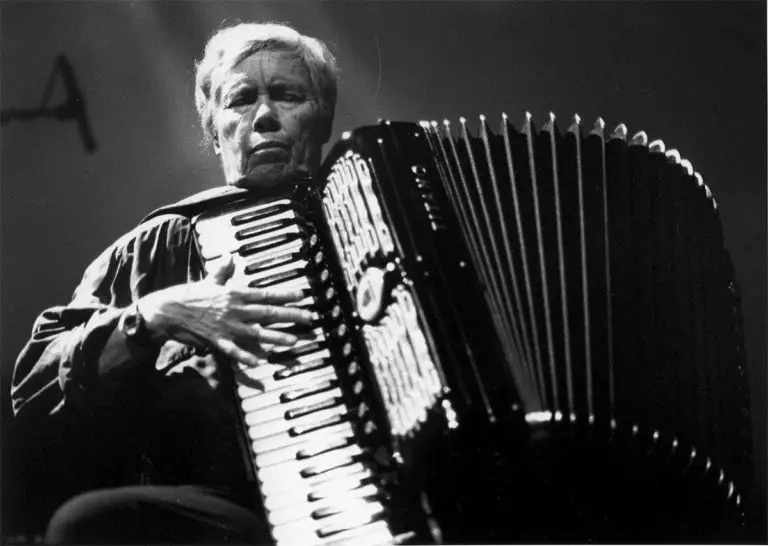Pauline Oliveros, experimental composer, electronic music innovator, accordionist, pioneer of the Deep Listening philosophy and Distinguished Research Professor of Music at Rensselaer Polytechnic Institute, passed away Thanksgiving Day at the age of 84.
 During my own time as a student at RPI studying soil mechanics and structural analysis of steel and concrete I somehow found the time to add an electronic arts minor to my transcript. I had heard of a class called ‘Deep Listening’ and it seemed to this then-junior engineering student like a curious subject to help round out the arts minor. It wasn’t until my senior year – when it was too late to reconfigure course schedules – that I had a taste of this subject when my advanced computer music class sat in on a session happening two floors above in West Hall.
During my own time as a student at RPI studying soil mechanics and structural analysis of steel and concrete I somehow found the time to add an electronic arts minor to my transcript. I had heard of a class called ‘Deep Listening’ and it seemed to this then-junior engineering student like a curious subject to help round out the arts minor. It wasn’t until my senior year – when it was too late to reconfigure course schedules – that I had a taste of this subject when my advanced computer music class sat in on a session happening two floors above in West Hall.
Near one side of the room a dozen or so students was Pauline Oliveros, deeply immersed in the multi-channel surround soundscape created with her cherry red accordion and numerous effects processing. Seeing the focus of those students in a music setting unfamiliar to me was incredible and proved an importance to her course.
Oliveros was interested in music from a young age, learning accordion from her mother in Texas at age nine and learning the French horn and tuba later on. Her education took her through music programs at the University of Houston and San Francisco State College where she obtained a Bachelor of Fine Arts degree in composition. She remained in academia for several years, teaching at Mills College and UCSD. In 1981 she left UCSD to come to the Hudson Valley, where a less restrictive creative environment allowed her to further explore performance and composition where she later founded the Deep Listening Institute.
She introduced herself to the idea of deep listening in the early 1950s when she got her first tape recorder. “I immediately recorded from my apartment window in San Francisco,” she recalls in a 2012 interview on WRPI in Troy, NY. “I listened as I recorded but when I listened back to the tape I heard things that I hadn’t heard when I recorded. So, I realized that I hadn’t really been listening. Since then my mantra has been listen to everything all the time and remind yourself when you’re not.”
The term “Deep Listening” hadn’t been coined for many years after her early experiments with tape recordings and work with the San Francisco Tape Music Center, though the ideas and teachings were there in Oliveros’ early academic career in experimental music and composition. “Deep Listening” as a term was a coincidence of pun associated with recordings made in the Dan Harpole underground cistern in Washington State in 1988 with two of her musical partners Stuart Dempster and Panaiotis who then donned the name for the group of Deep Listening Band.
Deep listening, in brief, is about treating listening as an active rather than passive process, a process that takes some effort. “Deep Listening is listening in every possible way to everything possible to hear no matter what you are doing,” Oliveros described. “Such intense listening includes the sounds of daily life, of nature, or one’s own thoughts as well as musical sounds. Deep Listening represents a heightened state of awareness and connects to all that there is.” That philosophy has led her to have a profound influence on music through improvisation, meditation, and use of electronic music.
Oliveros’ extensive fifty-year career as a leader in avante-garde and experimental music included numerous recordings under her own name and with the Deep Listening Band. Along with these recordings, Oliveros has many publications, videos and has given many lectures and workshops out of the classroom setting. She received several awards in her career, including the most recent biennial John Cage Award in 2012, given by the Foundation for Contemporary Arts in New York City to individuals who have made outstanding achievements in contemporary performing arts.
From 2001 until her passing, Oliveros had been teaching Deep Listening and conducting research at RPI in Troy. Her collaborative research at the university included the Adaptive Use Musical Instrument (AUMI) – a development of adaptive musical instruments through computer interfaces for those with mobility restrictions – and others including artificial intelligence programming for improvised music and data science research with the university’s School of Science.
In 2012 a celebration of Oliveros’ 80th birthday was held at the university’s Experimental Media and Performing Arts Center (EMPAC). Oliveros, along with the Deep Listening Band, gave a performance utilizing computer simulations, developed by architecture acoustics professor Jonas Braasch, of the acoustics of the cistern in which the band recorded in 1988, implemented using technology within the theater.
While Oliveros had an extensive career as a composer and performer, many people who have worked with her have been remembering her as a compassionate mentor, brilliant until her passing. Former student Blair Neal recalls of her impact, “Technology was never at the core of [class] discussions though, it was always the power of the human and how we communicated and listened to each other. That kind of teaching is something I try to carry with me always.” Another former student, Alex Bulazel shares simple words of gratitude, “Pauline was always an inspiration to her students, reminding them of the importance of creativity, artistic self-expression, humor, and most importantly, listening.”


Comments are closed.